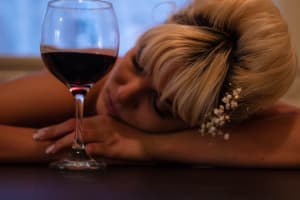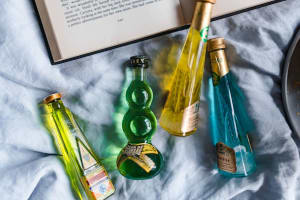
Alcohol Disrupts Normal Sleep Cycles
A review of 27 different studies showed that alcohol has an overall negative effect on sleep, and may lead to addiction. Alcohol does help healthy people fall asleep faster and rest more deeply, at least for the first half of the night. But alcohol reduces REM sleep, which should begin about ninety minutes after you first fall asleep. REM is short for Rapid Eye Movement and REM is necessary to healthy daytime functioning. During REM, your eyes move quickly beneath your eyelids as you dream, just as if you were still awake, but your body stays immobile so you don’t harm yourself. During REM, your mind processes the information and events of the previous day and prepares for the following day to come. People who short themselves on REM by heavy drinking before bedtime are more likely to feel tired the next day and have trouble concentrating. The more drinks you have before bed, the stronger the negative effects on your sleep quality will be. Reduced REM also increases the likelihood that you will sleepwalk, sleep talk, and have trouble remembering things. In addition to reducing the amount of restorative REM sleep, alcohol creates more abrupt shifts between different stages of sleep. You think you are sleeping more deeply, but in fact, you are not.Alcohol Increases the Risk of Sleep Apnea
Sleep apnea causes breathing to stop for short periods throughout the night. Even if you don’t have sleep apnea, drinking alcohol to fall asleep can cause you do develop it, especially if you are prone to snoring. People who already have sleep apnea and drink to fall asleep can make their apnea worse, lengthening the time it takes to start breathing again once breathing stops. This, in turn, reduces the amount of oxygen in the blood and increases the amount of carbon dioxide. In severe cases, increased carbon dioxide in the blood during sleep can result in death. Alcohol suppresses breathing. In people who have sleep apnea or who snore, drinking alcohol to fall asleep can actually cause your upper airway to collapse. The best prevention is to avoid alcohol completely. You may also need to consider using a CPAP machine to keep your airway open by artificially maintaining Continuous Positive Airway Pressure.
Using Alcohol as a Sleep Aid Can Cause Addiction
Recent research in addiction reveals that while anyone can become addicted to alcohol or drugs, some people are born with a genetic predisposition to addiction. When this genetic predisposition is combined with sufficient stress, the brain produces less and less of the specific chemicals needed to create feelings of happiness and stability. Reduced production of these necessary chemicals causes cravings for the addictive substance. The more you drink, the more you need to drink. Doctors now understand that addiction is not a character flaw, but rather a physical illness caused by having brain chemistry that reacts to addictive substances. Addiction often starts as an attempt to self-medicate while dealing with anxiety or depression. Insomnia or difficulty falling asleep are symptoms of both conditions. If you are drinking to fall asleep, you may already have untreated anxiety, depression, or stress, and if you happen to also have a genetic marker for alcoholism, you can become addicted before you even realize it. Alcohol should not be used as a sleep aid. A better strategy is to speak frankly with your doctor about your sleep problems and what might be causing them. Alcohol may seem to work for a while, but in the end, you’re liable to end up with a drinking problem on top of your sleep issues.How to Promote Good Sleep Without Alcohol
Develop good sleep habits and you will benefit from it all day, every day. Most people tend to skimp when life gets stressful, but a good restful night is more important than ever when you are stressed. Here are some basic tips for improving your sleep, even under stress:- Use your bedroom for sleep and sex only.
- No TVs, laptops, lighted alarms, or other screened devices in the bedroom.
- Keep your bedroom clean and calm, and the temperature a bit cool.
- At least an hour before going to bed, turn off all lighted devices and read or take a long bath.
- If you must have a bedtime snack, have a little starch and a glass of milk. Avoid alcohol, caffeine, and greasy foods.
- Check your caffeine consumption. Switch to tea or water if you drink more than a cup per day.
- Take chronic sleep problems seriously and talk to your doctor about underlying causes.
- For more tips read our article, 8 Tips for a Better Night’s Sleep.